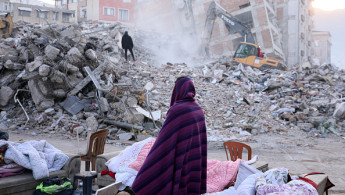Turkey opposition wary of potential election delay over earthquake
Turkish opposition parties have voiced concern over the possibility that President Recep Tayyip Erdogan and his Justice and Development Party (AKP) will postpone elections scheduled for May because of the aftermath of last week's devastating earthquake.
Six Turkish opposition parties were scheduled to announce their joint presidential candidate earlier this week, but were forced to postpone after the 6 February quake in which more than 40,000 people across Turkey and Syria have died so far.
The parties have expressed concerns that Erdogan and the AKP will stall the vote amid backlash over Ankara's handling of the earthquake aftermath.
Turkey’s constitution stipulates that an election can be postponed if the country is at war. Officials allied with Erdogan have drawn parallels between the earthquake and war, saying the natural disaster has had the same impact in terms of loss of life and physical devastation.
The opposition Republican People's Party (CHP) has disputed pro-Erdogan officials' use of the constitution to liken the earthquake with war.
"The constitution is very clear. Polls can be postponed only during war. So, as we are not in a war, the polls cannot be postponed," CHP leader Kemal Kilicdaroglu said in an interview with the Yetkin Report news portal.
Officials from the far-right Nationalist Movement Party allied with the AKP have said that any postponement of the vote could be perceived as a sign of "weakness of the state."
The deputy leader of the Iyi (Good) Party Kursad Zorlu also rejected the idea of postponing the elections. He wrote on Twitter: "Our party’s fundamental approach is to hold the polls on time."
AKP co-founder Bulent Arinc called earlier this week for the polls to be delayed.
"On these days when we are suffering from our history’s perhaps most painful disaster, it is a must that our country should immediately get rid of the election stress. To put it more openly, no elections can be held in May or June. They should be postponed," Turkish media quoted Arinc as saying.
He made three proposals regarding election dates. One was possibly combining presidential and parliamentary elections with the municipal elections set to take place next year.
A second option was moving the election date from May to November, well after the three-month state of emergency announced by Erdogan last week is lifted.
He also suggested that all political parties could agree on a new date if those two proposals are rejected.
Kamuoyuna saygıyla duyurulur. pic.twitter.com/PoiEQSWNCH
— Bülent Arınç (@bulent_arinc) February 13, 2023
Erdogan had already been facing intense scrutiny over his leadership before the earthquake struck, with rising inflation and a a currency crisis heavily impacting the purchasing power of many Turks.
The earthquake has posed further challenges to Erdogan’s power and has shed light on building standards many argue were not implemented properly by authorities.
Opposition parties have said that the polls should in the worst case scenario open on their originally set date of 18 June at the latest.





 Follow the Middle East's top stories in English at The New Arab on Google News
Follow the Middle East's top stories in English at The New Arab on Google News


